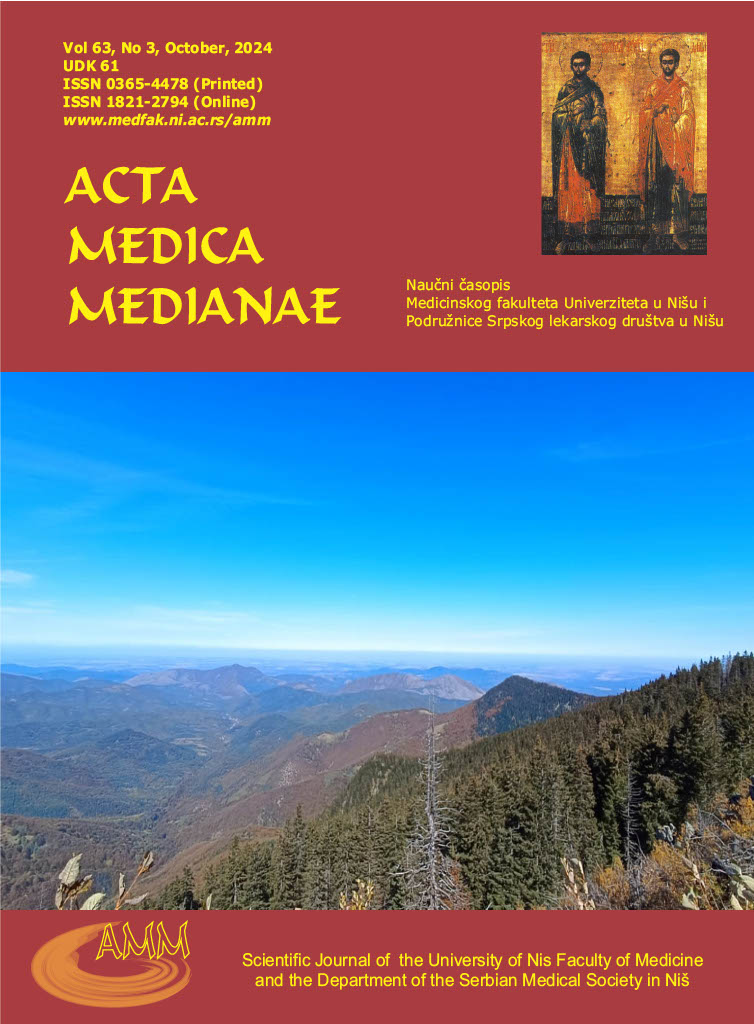DIMENSION OF KINDNESS IN THE STUDENT POPULATION
Abstract
The acts of helping others are a manifestation of a personal dimension called kindness, which is of particular importance in medicine. The capacity of people who work in medicine to show kindness is one of the factors that determines the future course of treatment.
The primary goal of the research is to determine the presence of the category of kindness in the group of students of the Faculty of Medicine and the group of students from other faculties of the University of Niš and to determine whether there is a difference in the category of kindness between the two groups of students.
A total of 230 subjects filled out an online questionnaire. The multidimensional instrument Kindness scale was used for the assessment of kindness. Data are presented as mean score values for each aspect of kindness, as well as maximal and minimal values. A comparison between the two groups was performed using Student’s t-test for two independent large samples.
The results did not show any difference in any of the studied dimensions of kindness in the groups of respondents. The results provided insight into the nature of kindness, its obstacles, and its importance, and they indicated the necessity of thinking about the dimension of kindness while working with students and in everyday clinical practice.
References
Arnsten AFT, Shanafelt T. Physician distress and burnout: The neurobiological perspective. Mayo Clin Proc 2021;96:763-9. [CrossRef][PubMed]
Asch SM, Atkins D, Walling A. If kindness were a drug, the FDA would approve it. J Gen Intern Med 2021;263-4. [CrossRef][PubMed]
Bowlby J, editor. Attachment and loss: Vol. I: Attachment. 2nd ed. New York: Basic Books; 1969.
Buchanan KE, Bardi A. Acts of kindness and acts of novelty affect life satisfaction. J Soc Psychol 2010;150:235-7. [CrossRef][PubMed]
Canter D, Youngs D, Yaneva M. Towards a measure of kindness: An exploration of a neglected interpersonal trait. Personality and Individual Differences 2017;106:15-20. [CrossRef]
Decety J, Smith KE, Norman GJ, Halpern J. A social neuroscience perspective on clinical empathy. World Psychiatry 2014;13:233-7. [CrossRef][PubMed]
Eisenberger NI, Master SL, Inagaki TK, Taylor SE, Shirinyan D, Lieberman MD, et al. Attachment figures activate a safety signal-related neural region and reduce pain experience. Proc Natl Acad Sci USA 2011;108:11721-6. [CrossRef][PubMed]
Emmons RA, Crumpler CA. Gratitude as a human strength: Appraising the evidence. J Soc Clin Psychol 2000;19:56-69. [CrossRef]
Eslinger PJ, Anders S, Ballarini T, Boutros S, Krach S, Mayer AV, et al. The neuroscience of social feelings: mechanisms of adaptive social functioning. Neurosci Biobehav Rev 2021;128:592-620. [CrossRef][PubMed]
Frith C, Wolprit D, editors. The neuroscience of social interaction: Decoding, imitating, and influencing the actions of others. Oxford: Oxford University Press; 2004. [CrossRef]
Fryburg DA. Kindness isn't just about being nice: The value proposition of kindness as viewed through the lens of incivility in the healthcare workplace. Behav Sci (Basel) 2023;13:457. [CrossRef][PubMed]
Gleichgerrcht E, Decety J. Empathy in clinical practice: How individual dispositions, gender, and experience moderate empathic concern, burnout, and emotional distress in physicians. PLoS One 2013;8(4):e61526. [CrossRef][PubMed]
Hart R. Prosocial behaviors at work: Key concepts, measures, interventions, antecedents, and outcomes. Behav Sci 2024;14:78. [CrossRef][PubMed]
Klein M. Envy and gratitude and other works 1946-1963. London: Virago; 1988.
Lyubomirsky S, King L, Diener E. The benefits of frequent positive affect: does happiness lead to success? Psychol Bull 2005;131:803-55. [CrossRef][PubMed]
McCullough ME, Emmons RA, Tsang JA. The grateful disposition: A conceptual and empirical topography. J Pers Soc Psychol 2002;82:112-27. [CrossRef][PubMed]
Meyer-Lindenberg A, Domes G, Kirsch P, Heinrichs M. Oxytocin and vasopressin in the human brain: social neuropeptides for translational medicine. Nat Rev Neurosci 2011;12:524-38. [CrossRef][PubMed]
Oishi S, Schiller J, Gross EB. Felt understanding and misunderstanding affect the perception of pain, slant, and distance. Soc Psychol Pers Sci 2013;4:259-66. [CrossRef]
Peterson C, Ruch W, Beermann U, Park N, Seligman M. Strengths of character, orientations to happiness, and life satisfaction. J Posit Psychol. 2007;2:149-56. [CrossRef]
Porath CL, Foulk T, Erez A. How incivility hijacks performance: It robs cognitive resources, increases dysfunctional behavior, and infects team dynamics and functioning. Organ Dyn 2015;44:258-65. [CrossRef]
Porges SW. Social engagement and attachment: a phylogenetic perspective. Ann N Y Acad Sci 2003;1008:31-47. [CrossRef][PubMed]
Porges SW. The polyvagal theory: phylogenetic substrates of a social nervous system. Int J Psychophysiol 2001;42:123-46. [CrossRef][PubMed]
Rowland L, Curry OS. A range of kindness activities boost happiness. J Soc Psychol 2018;159:340-3. [CrossRef][PubMed]
Shapiro J, Youm J, Kheriaty A, Pham T, Chen Y, Clayma R. The human kindness curriculum: An innovative preclinical initiative to highlight kindness and empathy in medicine. Educ Health (Abingdon) 2019;32:53-61. [CrossRef][PubMed]
Tang W, Wu D, Yang F, Wang C, Gong W, Gray K, et al. How kindness can be contagious in healthcare. Nat Med 2021;27:1142-4. [CrossRef][PubMed]
Watkins P, Woodward K, Stone T, Kolts R. Gratitude and happiness: Development of a measure of gratitude, and relationships with subjective well-being. Soc Behav Pers 2003;31:431-51. [CrossRef]
Youngs DE, Yaneva MA, Canter DV. Development of a measure of kindness. Curr Psychol 2023;42:5428-40. [CrossRef]

